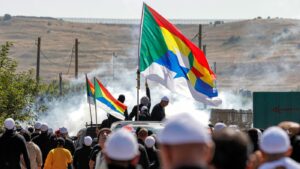Druze confrontation with the state is deeper than anger at wind farm

Druze community protest against an Israeli wind turbine project on agricultural lands in Majdal Shams in the Israel-occupied Golan Heights , 21 June 2023
Lily Galili writes in Middle East Eye:
The outburst of rage in large demonstrations from Syrian Druze last week and the subsequent violent Israeli crackdown might seem out of proportion to those thinking it’s only a protest against the wind farm in the occupied Golan Heights.
The Israeli project to build wind turbines on private Syrian land was certainly the trigger – but it unleashed deeper feelings of anger, hurt and humiliation which have been boiling for years.
Such feelings were aggravated by the passing of the Jewish nation-state law in 2018, which constitutionally enshrined the identity of Israel as a country for Jews only, forsaking all others.
The law prioritises Jewish supremacy over non-Jewish minorities – as does the current government, the first one to apply this supremacy so blatantly. The nation-state law – which has been criticised as a racist bill contributing to apartheid – and the prevailing sentiment of Jewish supremacy in Israel affects all minorities, namely Palestinian citizens of Israel, both Muslim and Christian.
The Druze were somewhat viewed as an exception. For years, they have been integrated into the police and army forces, nicknamed by many Israelis “brothers in arms” and considered “the good Arabs”.
But because of their conduct, and because they don’t pose a threat to Israel, they receive less attention from authorities. This neglect, along with the continued encroachment on Druze land on both sides of the border, is slowly triggering long-held grievances that threaten to rupture Israeli-Druze relations.
Protests and agreements
There are two groups of Druze people with close ties to one another; one living in the Golan Heights and the other living within Israel.
Around 25,000 people inhabit the occupied Syrian side, living mainly off tourism and agriculture. The vast majority of them refuse to take Israeli nationality though they can. Only about 10 percent have become Israeli citizens while the rest maintain their Syrian citizenship.
